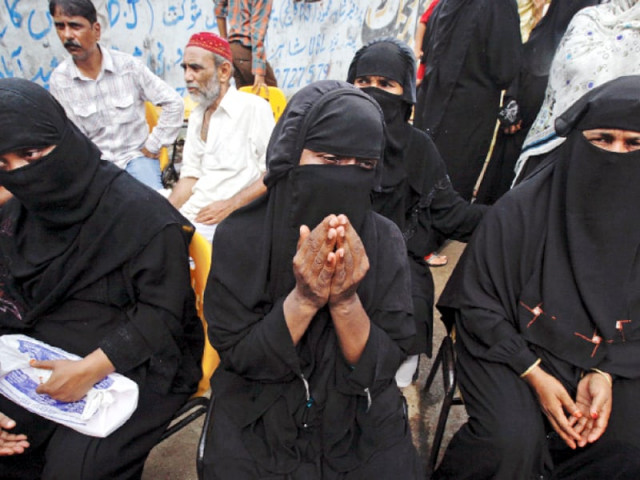Baldia factory fire: Two years on, victims’ families struggle to come to terms with their loss
The families are filing a suit against the Germany-based company who was the main client of Ali Enterprises.

Sixty-four-year-old Muhammad Jameel Faridi, a resident of Surjani Town, has no one to share the grief of his only son's tragic death. His wife, Nishat Fatima, the only person close to him, refuses to believe their son is gone forever.
The couple will be observing the second death anniversary of their son, Mohammad Danish Jameel Faridi, who was 34 at the time of his death, on the 11th of this month. Their plight is similar to the families of the 259 young boys and girls who were killed in the inferno at Ali Enterprises in Baldia Town on September 11, 2012.
"We have not talked about the tragic incident since that day," says Faridi. "She doesn't want to talk about it because she thinks he is alive and will come back home someday."
Fatima refuses to believe her son is gone because they did not see his body. Their son was one of the 17 indiscernible bodies who were buried unidentified, even after the DNA verification tests.
"I lost everything that day," he says. "Now I want to save other youngsters from meeting the same fate." For now, Faridi has rented a portion of the house he had bought with the compensation he received for his son's death. The rent and his son's monthly pension of Rs4,200 now supports the old couple.
What Faridi wants is for all factories to adopt international standards of fire safety. He, along with the other victims' families, believe that the Germany-based textile company, KIK, the main buyer of Ali Enterprises, and the Italian certification company, RINA, which had issued the SA8000 certificate to the garment factory, should also be held responsible for the tragedy.
Two Germany-based non-governmental organisations, Medico International (MI) and the European Centre for Constitutional and Human Rights (ECCHR), are helping the affected families file a case against the KIK in German courts. Some of the victims' families recently met representatives of the two organisations at the Mehran Hotel in Karachi to discuss the case and their role in the proceedings.
Three members from the affected families are filing a suit against the KIK, while the MI and ECCHR have arranged a lawyer for the case in Germany. The National Trade Union Federation of Pakistan (NTUFP) is looking after the case requirements in Pakistan.
"We are working for justice and for the protection of human rights," said Dr Thomas Seibert, the South Asia projects coordinator for MI.
Seibert, who is a political activist working for the protection of human rights, claims to have witnessed the suffering of the garment factories workers. He feels that German companies who buy products from these factories should be held accountable for the workers' suffering. "Germans wear clothes that have been manufactured in Pakistan and Bangladesh but the clothes are impregnated with the blood of these workers," he said, explaining the reason behind their visit and interest in the case.
He says that German consumers can force manufacturers in Pakistan to improve their standards and adopt maximum safety measures in their workplaces. The two NGOs want the KIK to compensate the affected families of the Ali Enterprisers. "I don't believe the KIK was unaware of the working conditions in Ali Enterprisers," he says. "These companies always absolve themselves of responsibility because they have contractors and sub-contractors, but all of them are part of the system."
According to Seibert, the KIK is refusing to take responsibility and is delaying the negotiation process for the compensation for affected families, which it had promised earlier.
Dr Carolijn Terwindt, the legal advisor for the ECCHR, hopes the case will set a good precedent as it will be the first time in the history of Europe that workers from another country will be taking a company to court in Germany.
"Our case is very strong and so are our legal arguments," she said. "The courts will be compelled to listen to us."
According to Terwindt, the court will have to acknowledge the impact of the global economy that has emerged in the last century due to which the companies have outsourced their inventories. "KIK can outsource its manufacturing but it must accept the responsibilities that come with the outsourcing."
Published in The Express Tribune, September 11th, 2014.



















COMMENTS
Comments are moderated and generally will be posted if they are on-topic and not abusive.
For more information, please see our Comments FAQ